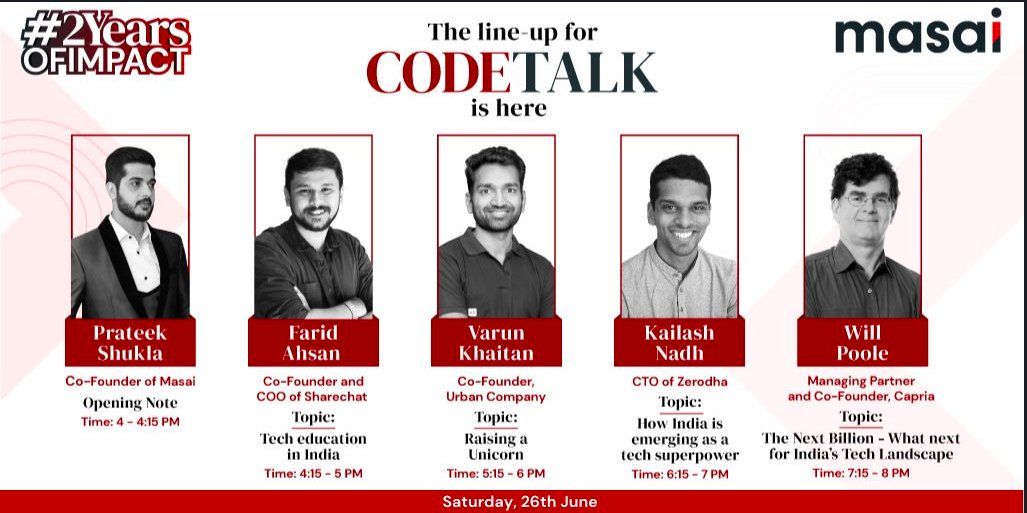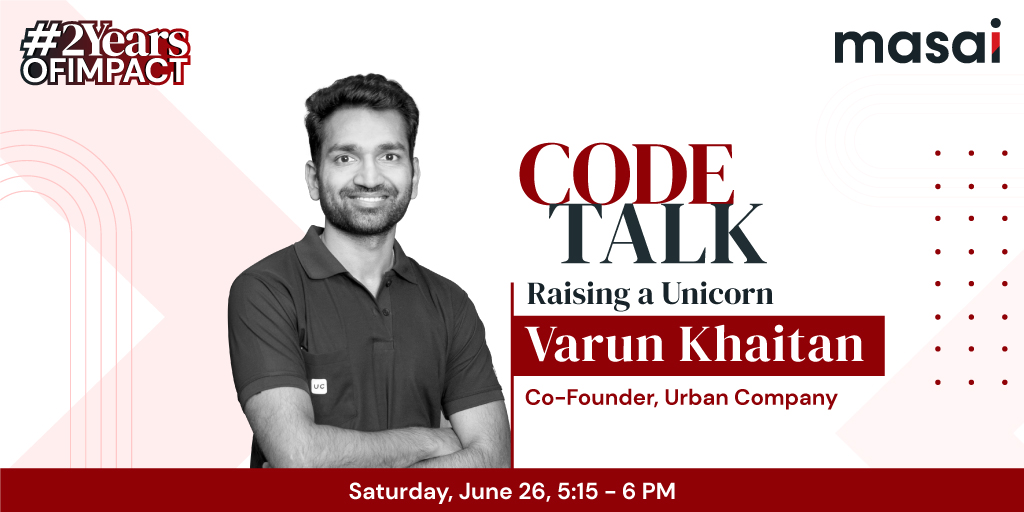Celebrating #2YearsOfImpact at Masai School
Degrees and institutions don't guarantee skills. They offer a certificate, and a value that varies from institute to institute, and Farid is an iconic example who personalizes this emotion.

India produces 1.5 million engineers in India every year, and only a fraction of them are employable. Why? Indian education focuses on exams and rote learning, not on real-world job skills. The only thing these students have to show after 4 years of college is a degree and a mountain of student loans.
Prateek, Nrupul & Yogesh(Co-Founders of Masai) wondered, what if we take the financial risk of education? Instead of degrees, we focussed on intersecting skill development and job readiness with disciplined coding education.
This is how Masai School was established, an educational institution that believes in the students, and is willing to work equally hard to ensure that its students are equipped with skills, and trained to put them to use and contribute towards the growth of their organization, and ultimately the nation.
We recently celebrated our #2YearsOfImpact, and this blog is a written account of everything that happened at our Mega event celebrating #2YearsOfImpact, and if you’re reading this, we invite you to celebrate and join us.
The traditional model of higher education is broken, and educational institutions are getting paid irrespective of the child succeeding or deriving value? They have no incentive to work towards the success of their students. Therefore no fees at Masai School and our students don’t pay us until they succeed, therefore this allows us to align our incentives with theirs, says Prateek Shukla kickstarting the anniversary event.
To further make the event interesting, Prateek Shukla unveils the “Masai Impact Book”, which includes the highlights of our journey so far, stories of a few of our students, our hiring partners, and our plans for the future.
Watch this video to experience our 2-year journey in just a few minutes.
Last 2 years, Masai School has created an impact where students from various backgrounds have gone to become coders with many of them getting their first-ever jobs in tech. So far, 250+ students have graduated, and we aim to impact 1000s more in the days to come. There’s a lot of potential in this country.
“The mission of Masai is to unlock the human potential”, Prateek Shukla
Farid, Co-Founder ShareChat
Farid, Co-founder, ShareChat, is a material science engineer on degree, but an internet entrepreneur who’s building India’s homegrown social network that’s changing the way Indians communicate. Today ShareChat is used actively by millions of users, and taking India one step closer to hyperconnectivity, enabling communication and collaboration.
Degrees and institutions don’t guarantee skills. They offer a certificate, and a value that varies from institute to institute, and Farid is an iconic example who personalizes this emotion.
In this session Yogesh, our co-founder joins him for a conversation, starts with the thought – “Employers are looking for skill quotient and the mindset quotient”.
“Prateek is both a friend and a mentor, having known him for 8 years, he’s been always very helpful, and looking at his work so far, I am sure that Masai School has a lot of potential, and at some point, people would want to join Masai School rather than write JEE, and I have complete faith and belief in Prateek’s vision”, says Farid who joins us in our conversation to discuss the “Future of Tech Education in India.”
How important is a technical degree to become a software developer?
Farid – I graduated as a Material Science Engineer, but am a Software entrepreneur by profession. So far I’ve hardly applied anything I learned in college. Degrees and institutions don’t guarantee skills. They offer a certificate, and a value that varies from institute to institute. However, these aren’t a measure of your skill, and capabilities. In my case, I started exploring the world of computers early in my childhood, and all of those little experiences added up and compounded to ultimately help me in building ShareChat.
Today, there are chances that a @masaischool grad may be better at coding than an avg IIT grad.
How did you learn to code, and How should someone learn to code?
“First tried my hands at web, and windows based apps in grade 11, and soon the interest developed. I think all the people who can’t learn to code are either lazy or have chosen a poor problem statement”, says Farid.
“Software” gives you the power to create impact at scale and to do that you do not need a degree. Unfortunately, the basics of English, and maths are still needed to get started, the barrier to learning to code is less. If you want to learn to code, you got to learn to fail, and if you are relentless in your pursuit to solve a problem at hand, you will become a good coder.
“Many of Masai graduates today work ShareChat, and you usually hire from top institutes. How would you fare our student’s performance?”, asks Yogesh
“Relentlessness to solve a problem, to build things, to build fast, and to build more”, Our first hire from Masai was Hassan who was one of our fastest-growing SDEs in our team. After hiring from Masai, we realized Masai is a premier institute as well. Eventually, at some point, people would want to join Masai rather than write JEE or similar exams, and I have complete faith in Prateek’s vision, says Farid as his closing thoughts.
Varun Khaitan, Co-Founder UrbanCompany
Varun Khaitan joins us for Masai School’s 2-year anniversary celebration. An Electrical Engineering graduate from IIT Kanpur, Varun has previously worked with Qualcomm and the Boston Consulting Group before he Co-Founded Urban Company in 2014 with his friends Abhiraj Singh Bhal, and Raghav Chandra. UrbanCompany is now based out of Gurugram, Haryana, and valued at more than $2.1 billion which aims to impact 1 Million service professionals in the next decade.
Ankur Kayesth, SVP at Masai School joins Varun this evening at our anniversary celebration to talk about what goes behind building a billion-dollar startup (unicorn).

“Engineering and technology are built to make the lives of humankind easier. If you look at the world around us, a lot runs on the internet and it’s the software engineers and product managers that are also running the same world,” says Varun talking about the impact of technology in our lives.
On talking about his experiences in building UrbanCompany Varun says, “The last 7 years, we have scaled to about 60 engineers in our engineering team. The scale of the products that we operate with, it only explains the importance of every engineer’s role. Ever since the existence of mankind Engineers have always set out to solve problems, and make lives easier.”
Talking about UrbanCompany with passion Varun explains how the company has 3 major points of focus –
- Technology – Over 90% of the human interactions on UrbanCompany are powered by technology, and one of the key areas of focus is to leverage technology to solve problems.
- Training – One of the major problems with the service industry in India is the lack of standardization and skills. Therefore, UrbanCompany has set up over 200 training institutes to train service professionals in courses running from 2 days to 2 months, depending on the requirement. Along with that, we provide them with kits and everything else they may need to service a client and deliver a smooth experience. We aim to work with over 1 million service professionals in the next decade.
- Community – Hardworking men, and women in India have always been paid lesser because of the middlemen taking away most of their share of incomes. At UrbanCompany almost every service partner who joins is able to triple their income, and many have bought their first houses, and vehicles after joining us. We have been very focused on ensuring that our service partners receive top-notch experiences, and it’s a no-brainer that this would result in exceptional customer experiences. If our community is happy, that will only spread, and unlike covid, this would be desired, and good.
From Varun’s talk, we could sense the potential that can be tapped into when community, and technology come together, and with the customer centricity embedded in the DNA of Urban Company, we believe that they are set on their path of meeting their vision of impacting millions of lives.
On being asked – “What advice would he give to aspiring developers?”
Varun says – “The world is changing very fast, and from what we have seen so far from 2010 to 2020, I believe we live in a golden era, and perhaps one of the best times in India. We will see a lot of change, and technology will play a key role in this.”
- Students should be willing to work hard and be honest with their efforts
- Think in decades, envision how you’d want to see yourself in the next 10/20 years, and plan for that
- Trust your heart, don’t be afraid to take a few risks, and remember that you will achieve all the goals you have set your mind to
- Trust the people around you, because that will help you prepare for the unknown(s) that life throws your way every now and then
Varun ends his talk by congratulating the entire team of Masai School for setting new standards for educational institutions, and feels that Masai will bridge the gap, and help fill the shortfall of quality engineers.
The next guest who joins us for our anniversary celebration is Kailash Nadh, CTO of Zerodha.
Kailash Nadh, CTO – Zerodha
At the Masai Code Talk session, our Co-Founder and CTO, Nrupul Dev talked with Kailash Nadh, CTO of Zerodha to discuss “How India is emerging to become a superpower in technology?”
Zerodha is a Bengaluru-based online stock trading startup founded in 2010 by Nithin Kamath and Nikhil Kamath. Zerodha is one of those rare startups that became a billion-dollar company without raising any external funding. The engineering team at Zerodha operates on a very lean structure and still employs only 30 engineers despite being around for more than a decade, and now having clocked more than 5 million users using the platform.
In this session, we learn from Kailash about his experiences as a developer, engineer, and architect who heads the technology at Zerodha, a company that processes billions of data points every second.
On being asked what Tech stack is used at Zerodha, and what is the approach taken towards building applications, and products at Zerodha, Kailash mentions how they have always focused on using open source software and self-hosting them, rather than being dependent on external enterprise software.
We have multiple products, some for compliances, finances, internal communication, etc, but all of this stack wasn’t built in one go. We started with one problem and built on that, and today we have multiple complex technological stacks running, with most of them being self-hosted and self-managed. This allows us to have control, and whenever we feel the need to make major changes, we can do so without any external dependency. I think FOSS has allowed us to be very fluid in our approach to building the architecture, and the systems of Zerodha.
Nrupul asks Kailash what does Zerodha looks for while hiring engineers and developers?
“We don’t particularly look for anything, definitely not educational backgrounds or degrees. We look for attitude, grit, and accountability.”
There is no hierarchical structure where someone asks the other to do this or that. Being a very lean team, everyone is really accountable for the problem statements that we are all trying to solve as a company, and that is the kind of attitude we love to have at Zerodha.
What’s the biggest problem Zerodha is facing today, as an organization.
Kailash says, “It is the same old technological problem that people faced 30 or 40 years earlier – Scaling of our database and concurrency. Everybody faces these problems, but once you solve these two, any big company would have solved most of its problems it has.”
What do you think of the tech hype around ML, AI, and Data Science?
Kailash Nadh – “The tech hypes have their own cycles of a renaissance. If you can encounter a real problem by trying to solve it by writing code, you might want to then tap into AI to help you solve it better. Do it bottom-up but don’t overhype it for the sake of having to use AI.”
“Blockchain is also one of those overhyped technologies, and cryptocurrency is one major use-case. We never use it in any of our products. Even when it comes to Machine Learning (ML), Artificial Intelligence (AI), we hardly use them either,” says Kailash.
How do you find the time to do so much, and still contribute to Open Source projects?
It’s not that I need to take time out for it, contributing to FOSS is something that I love to do. I learned to code by examining other’s code, trials & errors, and experimenting with different codes, and doing this for years got me better at programming, and I think one of the reasons for contributing is a way of giving back to the community and allowing more and more people to learn, and thrive.
I also feel that there is massive potential for FOSS in India, and with community, and collaboration at a large scale, we can build a strong technological backbone.
How should one start contributing to FOSS(Free and open-source software)?
There are countless projects that need help in maintenance, and many projects that need help with documentation. (Coders hate to write documentation). So if someone is looking to contribute towards open source, and is serious about it, they can get started with documentation or maintenance. But instead of taking a top-down approach where you affirm that “I want to contribute to FOSS”, and start hunting for projects, find a software that you use, and figure out a way to contribute to that.
Once you’ve built some momentum, you can start building and contributing to other projects, and all of that will eventually snowball. Write code to solve problems.
We started FOSS United with the aim to encourage individuals to participate and contribute to open source projects, and we have several grants and other ongoing events where developers are welcome to participate.
Will Poole, Co-Founder @Capria Capital
In our 4th and final session for the day, Masai School Co-Founder and CEO Prateek Shukla talk with Will Poole, the Managing Partner and Cofounder of Unitus Capital, and Capria Capital to discuss what’s really next for the technology landscape in India.
In his technology career, he was a Corporate Vice President at Microsoft where he led several business lines, including the USD $13 billion Windows client business. Will’s career started by founding startups at the dawn of the PC era, working in the early days at Sun Microsystems, and pioneering e-commerce at eShop, which he co-founded in 1991 and was acquired by Microsoft in 1996, and he joins us to discuss “The Next Billion, and what’s next for India’s tech landscape?”
Kickstarting the Code talk, Prateek asks – “What makes Bill Gates different?”
Will replies, – “Although I haven’t directly worked with Mr. Gates, I’ve worked with him closely on several projects, and one thing that truly stands out for him is his remarkable versatility of knowledge. At one moment he can be talking about business strategy, and at another moment you may find him talking about core technologies. He can converse with CEOs of billion-dollar companies, and with hardcore technologists with fluency.
What makes him stand out is his innate curiosity, and his ability to build businesses, and industries around his observations.
What’s the trend in Computer Science you’ve observed since your time at Brown University to today?
Back in 1983, about 25,000 students graduated in Computer science, this number peaked at 40,000 over the years, and gradually declined until now. The number of students taking interest in computer science, and technology has increased and is expected to only increase.
Compare that to the lakhs of engineers who graduate from India. A Computer science degree enables a computer science graduate to contribute to almost any aspect of life. Today a biologist works with big data, AI/ML, and so many other technologies, similarly, there are many other fields where the use of technology is almost in-evident. Computer science is going to be fundamentally necessary for any industry.
What parallels are there between Indian tech ethos & Silicon Valley?
Unitus Ventures was founded in 2012, and I am a proud investor in Masai School. Since then, we have taken all our learnings from the Indian ecosystem, and we are applying that in some of the upcoming technical hubs of the world such as Nairobi, Cairo, and Jakarta. The Indian tech ecosystem is emerging in Delhi, and Bangalore and these have remarkable parallels with Silicon Valley. India is catching up rapidly, and it’d be exciting to see the technological landscape.
How should one go about building their careers in tech?
Building a career in tech is about understanding what you’re learning, and knowing how to apply that learning to other fields. It’s about Adaptability, curiosity to explore, and the willingness to re-invent self. Talking about the future of India, Will mentions that with free and low-cost data options it is possible for anyone to code from anywhere, and still be an effective member and contributor to global teams.
There’s no reason why Indian engineers can’t get into the global landscape. With the adoption of remote culture being accelerated by the pandemic, the potential for Indians to make a mark in the global landscape is immense.
May the code be with you.
If you’re interested in kickstarting your coding career, visit Masai School.

